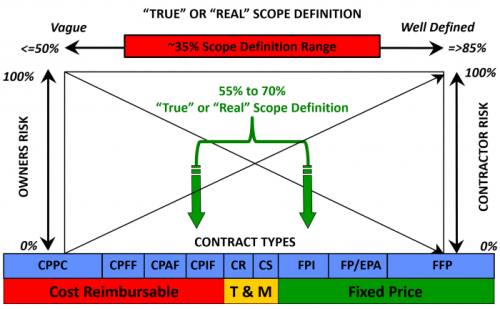for Incentive Contracts
FEATURED PAPER
By Edouard J. E. Petit
SKEMA Business School
Paris, France
Abstract
Contracts are in our everyday life and even more in the corporate world. One of the forms it can take is the incentive contract, with several types like Cost reimbursable or Fixed price. In this paper, a SWOT analysis will be done comparing the different incentive contract types. Another question still resonates for project managers or project board: What target should we choose to maximize profit for both Project owner and contractor? Using a learning curve based model and a Kepner-Tregoe (K-T) decision analysis method, a theory about that deadline and a way to think about it will be built in this paper. Applied on a conceptual project, we will see the results as a deadline resulting in cost-time trades-off.
Keywords: Accuracy, Budgets, Deadline, Target, Reliability, Incentive Contracts, Contracts, Trades-off
Introduction
Context
As they are now a big part of our contracts nowadays, Contracts can be found under multiple forms or types. Contracts are defining now the life as we know, like visiting a website, rent a flat, buy a car or even use sports equipment. Moreover, there is one field where contracts are a massive part of the activity: the corporate sphere. Corporations are using contracts everywhere for every action and every deal — employee hiring, selling a product, marketing activity, and others field. Also, when comes a project definition; contracts can take different forms. Each contractor needs to find the pros and cons of every detail of the project, the feasibility, the deadline, the cost, the person-hours requested and needed and other aspects. In the end, the contract must take a form to motivate every contractor to respect the conditions and give the best of what they can do. One of the possible contracts type stimulating every party is the incentive contracts.
A legal definition of incentive contract, based on USA law:
“Incentive contracts specify a completion date that must be met in order for a contractor to receive his/her full fee or profit. Positive incentives can be built in which the fee may be increased for early completion. On the other hand, a negative incentive can also be included in the fee through liquidated damages if the scheduled date is not met.” [1]
Defining incentive contracts
Most of the contracts, incentive or not, contains a deadline, and this paper will be based on contracts containing a time condition. However, several incentive contract types exist, ordered by potential contractor risk.

Figure 1 – Scope Definition and Risk Allocation by Contract Type[2]
At one extreme is the “cost-plus” contract (Cost Plus Percentage = CPP and the Cost-Plus Fixed Fee = CPFF). Contracts like that mean paying actual cost plus a percentage of the total cost or a fixed fee after the project ends. This kind of project is known to generate cost overrun.
More…
To read entire paper, click here
Editor’s note: This paper was prepared for the course “International Contract Management” facilitated by Dr Paul D. Giammalvo of PT Mitratata Citragraha, Jakarta, Indonesia as an Adjunct Professor under contract to SKEMA Business School for the program Master of Science in Project and Programme Management and Business Development. http://www.skema.edu/programmes/masters-of-science. For more information on this global program (Lille and Paris in France; Belo Horizonte in Brazil), contact Dr Paul Gardiner, Global Programme Director paul.gardiner@skema.edu.
How to cite this paper: Petit, E.J.E. (2019). Theory about Target Deadline for Incentive Contracts, PM World Journal, Vol. VIII, Issue IV (May). Available online at https://pmworldlibrary.net/wp-content/uploads/2019/05/pmwj81-May2019-Petit-Theory-about-Target-Deadline-for-Incentive-Contracts2.pdf
About the Author

Edouard J. E. Petit
Paris, France
![]()
Edouard J. E. Petit is a Web and Software engineer with three years of experience with Microsoft Technologies. Born in Normandy, he followed his Engineering degree in an apprenticeship program. Right after his graduation, he decided to apply for a double degree program: Master in Management / MSc in Project and Programme Management and Business Development at Skema Business School. Having done a semester in the USA, he did also work in Malta (Betclic) and UK (Dynatrace). During the last year at Skema, he followed a Contract Management course directed by Dr. Paul D. Giammalvo, CDT, CCE, MScPM, MRICS, GPM-m Senior Technical Advisor, PT Mitrata Citragraha.
Edouard lives in Paris, France and can be contacted via http://epetit.fr or edouard.petit.16@gmail.com
[1] Incentive Contract Law and Legal Definition | USLegal inc, Web 12/08/2018 | <https://definitions.uslegal.com/i/incentive-contract/>.
[2] Adapted from Garrett, Gregory (1997) “World Class Contracting”, 1st Edition by Giammalvo, Paul D (2015) Course Materials.| GUILD OF PROJECT CONTROLS COMPENDIUM, Web 12/12/2015 |< http://www.planningplanet.com/guild/gpccar/introduction-to-managing-contracts>









